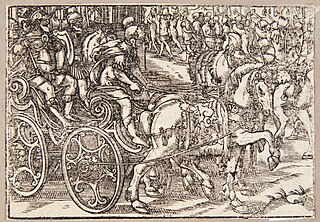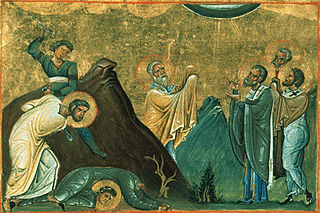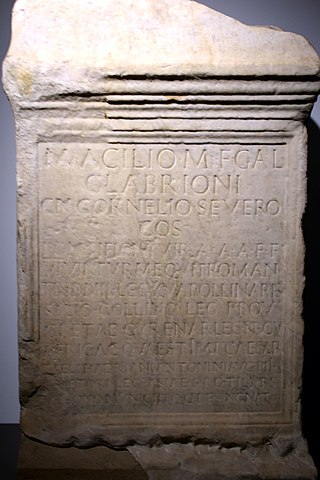Related Research Articles

The 90s was a decade that ran from January 1, AD 90, to December 31, AD 99.
AD 91 (XCI) was a common year starting on Saturday of the Julian calendar. At the time, it was known as the Year of the Consulship of Glabrio and Traianus. The denomination AD 91 for this year has been used since the early medieval period, when the Anno Domini calendar era became the prevalent method in Europe for naming years.
AD 95 (XCV) was a common year starting on Thursday of the Julian calendar, the 95th Year of the Anno Domini (AD) designation, the 95th year of the 1st millennium, the 95th year of the end of the 1st century, and the 5th year of the 10th decade. In the Roman Empire, it was known as the Year of the Consulship of Augustus and Clemens. The denomination AD 95 for this year has been used since the early medieval period, when the Anno Domini calendar era became the prevalent method in Europe for naming years.

Lucius Sergius Paulus or Paullus was a Proconsul of Cyprus under Claudius. He appears in Acts 13:6-12, where in Paphos, Paul, accompanied by Barnabas and John Mark, overcame the attempts of Bar-Jesus (Elymas) "to turn the proconsul away from the faith" and converted Sergius to Christianity.
The gens Acilia was a plebeian family at ancient Rome, that flourished from the middle of the third century BC until at least the fifth century AD, a period of seven hundred years. The first of the gens to achieve prominence was Gaius Acilius, who was quaestor in 203 and tribune of the plebs in 197 BC.

Dionysius the Areopagite was an Athenian judge at the Areopagus Court in Athens, who lived in the first century. A convert to Christianity, he is venerated as a saint by multiple denominations.

Manius Acilius Glabrio was a plebeian Roman politician and general during the Republican. He served as consul in 191 BC while Rome was at war with the Seleucid Empire. He defeated Emperor Antiochus the Great at Thermopylae, helping establish Roman unipolar control over the Mediterranean, and was awarded a triumph. Credible accusations that he had embezzled spoils from his conquests in Greece while consul caused him to withdraw from his attempt to run for censor, after which he largely retired from public life.
Titus Flavius T. f. T. n. Clemens was a Roman politician and cousin of the emperor Domitian, with whom he served as consul from January to April in AD 95. Shortly after leaving the consulship, Clemens was executed, allegedly for atheism, although the exact circumstances remain unclear. Over time, he came to be regarded as an early Christian martyr.
Pomponia Graecina was a noble Roman woman of the first century who was related to the Julio-Claudian dynasty. She was the wife of Aulus Plautius, the general who led the Roman conquest of Britain in 43 AD, and was renowned as one of the few people who dared to publicly mourn the death of a kinswoman killed by the Imperial family. It has been speculated that she was an early Christian. She is identified by some as Lucina or Lucy, a saint honoured by the Roman Catholic Church.
Manius Acilius Glabrio may refer to:

Erastus of Corinth, also known as Erastus of Paneas, held the political office of steward, in Corinth, according to the Epistle to the Romans 16:23 of the New Testament. The office is defined as "the manager of household or of household affairs" or, in this context, "treasurer". The King James Version uses the translation "chamberlain", while the New International Version uses "director of public works". A person named Erastus mentioned in 2 Timothy 4:20 and Acts 19:22 is often taken to be the same person.
Marcus Acilius Glabrio was a Roman senator who was appointed consul suffectus in 33 BC.
Manius Acilius Aviola was a Roman senator who served as Consul ordinarius in 239 as the colleague of Emperor Gordian III. He is considered a son of the Manius Acilius Aviola who is mentioned as being present as a child at the meetings of the Arval Brethren for the years 183 and 186; as well as the descendant of the homonymous consul of AD 122.

Manius Acilius Glabrio Gnaeus Cornelius Severus was a senator of the Roman Empire. He was consul ordinarius in 152 with Marcus Valerius Homullus as his colleague. Acilius Glabrio is known almost solely from surviving inscriptions.
Manius Acilius Aviola was a senator of the Roman Empire. He was consul ordinarius in AD 54 with Marcus Asinius Marcellus as his colleague. Aviola is also recorded as being governor of Asia in 65/66. According to Brian Jones, Aviola was also curator aquarum from 74 to 97. He is known almost solely from surviving inscriptions.
Gaius Bellicius Flaccus Torquatus Tebanianus was a Roman senator during the reign of Hadrian. He was consul posterior in 124 with Manius Acilius Glabrio as his colleague.
Lucius Acilius Strabo was a Roman senator active during the first century AD. He was suffect consul for the nundinium September-October 80 as the colleague of Sextus Neranius Capito. He is known entirely from inscriptions.
Tiberius Claudius Cleobulus was a Roman senator.
Aulus Egrilius Plarianus, also known as Aulus Egrilius Plarianus Pater was a Roman senator, who flourished during the reign of Hadrian. He was suffect consul in the nundinium of October to December 128 with Quintus Planius Sardus Varius Ambibulus as his colleague; as the first of his family to accede to the consulate, he is a homo novus. Plarianus is known entirely from inscriptions.
References
- ↑ Suetonius, "Domitian", ch. 10
- ↑ "Cassius Dio — Epitome of Book 67". penelope.uchicago.edu. Retrieved 2022-11-05.
- ↑ Satires, iv.94-96
- ↑ Gallivan, Paul (1978). "Who Was Acilius?". Historia: Zeitschrift für Alte Geschichte. 27 (4): 621–625. ISSN 0018-2311. JSTOR 4435641.
- ↑ Christer Bruun, "Zwei priscillae aus Ostia under Stammbaum der Egrilii", Zeitschrift für Papyrologie und Epigraphik , 102 (1994), pp. 215–225
- ↑ Suetonius, "Domitian" ch. 10. On the meaning and translation of this, see Weiß, Alexander. "Soziale Elite und Christentum. Studien zu ordo-Angehörigen unter den frühen Christen." Berlin/Boston: De Gruyter (2015), p. 166.
- ↑ Ecclesiastical History, 3.14
- ↑ Weiß, Alexander. "Soziale Elite und Christentum. Studien zu ordo-Angehörigen unter den frühen Christen." Berlin/Boston: De Gruyter (2015), pp. 166–167.
- ↑ For example, "Underground Christian Rome", The Atlantic (July, 1891), pp. 14ff
- ↑ Dondin-Payre, Monique (1993). "Exercice du pouvoir et continuité gentilice. Les Acilii Glabriones du IIIe siècle av. J.-C. au Ve siècle ap. J.-C". Publications de l'École Française de Rome. 180 (1).